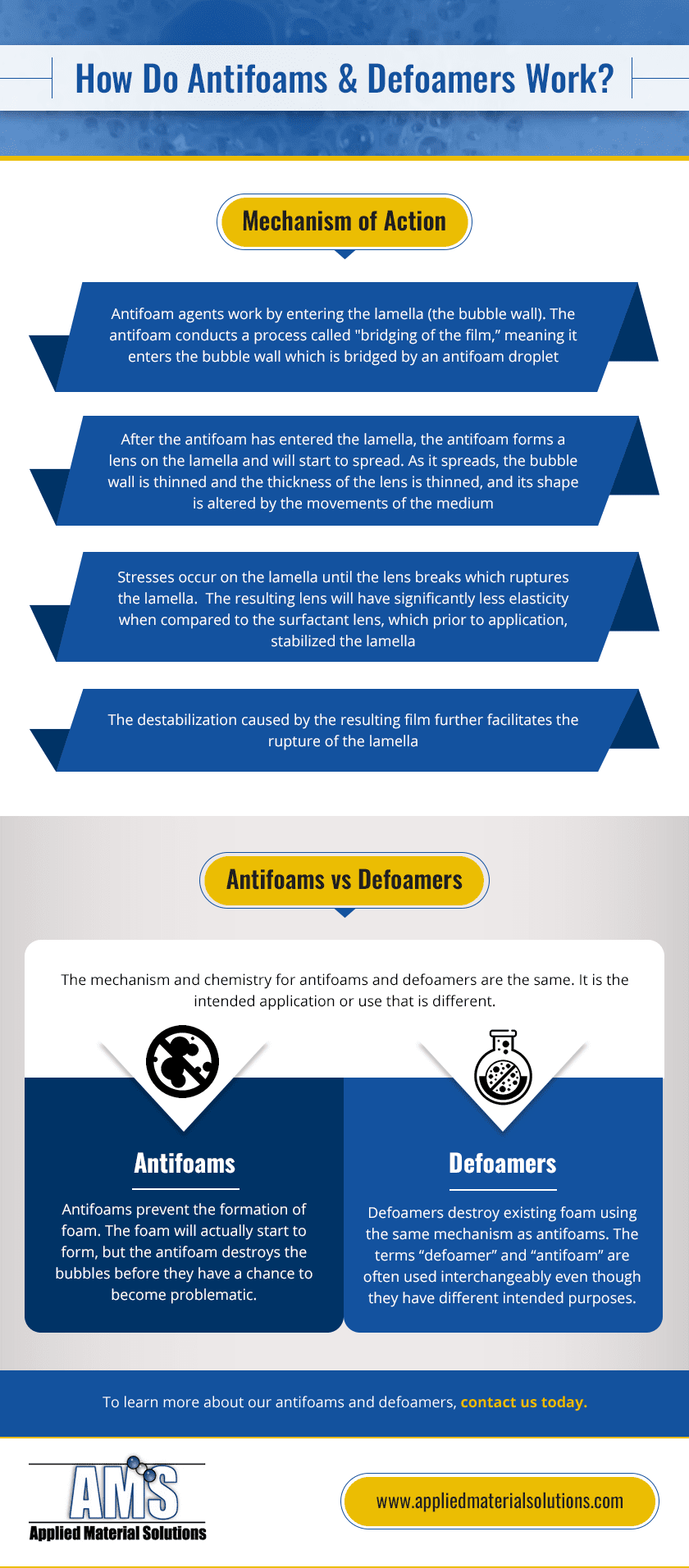Choosing the Right Defoamers for Your Industry Needs
Choosing the Right Defoamers for Your Industry Needs
Blog Article
The Duty of Defoamers in Enhancing Product Quality and Performance
In numerous producing processes, the presence of foam can significantly hinder item top quality and operational efficiency. Defoamers act as necessary additives that minimize this issue, ensuring smoother production workflows while boosting the visual and practical features of the end products (defoamers). Their application spans a wide range of sectors, from food and beverage to drugs, where consistency and reliability are extremely important. The option of the ideal defoamer can be vital to attaining ideal results, increasing vital questions regarding formula compatibility and efficiency metrics that warrant further expedition.
Comprehending Defoamers
Comprehending the function of defoamers is necessary for maintaining product high quality across numerous sectors. Defoamers are chemical ingredients made to lower and prevent the development of foam in liquid systems, which can negatively impact processes such as mixing, filling, and surface tension. Foaming can lead to ineffectiveness, product flaws, and compromised aesthetic charm, making defoamers an important part in manufacturing operations.
In commercial applications, defoamers aid to improve product uniformity and stability. The reliable use of defoamers not just makes sure smoother manufacturing procedures yet likewise contributes to exceptional product efficiency.
Additionally, the selection and solution of a defoamer need to align with certain application requirements, such as compatibility with various other ingredients, performance under varying temperature level and pH conditions, and potential regulative restraints. Eventually, recognizing defoamers' functions and their value in numerous formulations is essential for maximizing production and making sure the best output.
Sorts Of Defoamers
Defoamers can be classified right into several types based upon their composition and system of activity. The key kinds include silicone-based, non-silicone natural, and not natural defoamers.
Silicone-based defoamers are among the most efficient, mostly as a result of their ability to spread rapidly on the fluid surface area and disrupt foam formation. Their special chemical structure permits premium security, making them ideal for high-temperature applications and settings with varying pH levels.
Non-silicone natural defoamers, often composed of fatty acids or natural oils, are valued for their biodegradability and reduced poisoning. These are typically utilized in food and drink applications where safety and security and ecological influence are extremely important.
Inorganic defoamers, that include compounds like talc or calcium carbonate, act by boosting the thickness of the liquid, consequently reducing foam stability. They are often utilized in commercial procedures where compatibility with other materials is not an issue.
Each sort of defoamer has distinctive benefits and restrictions, permitting tailored remedies depending upon the details frothing concerns come across in various applications. Comprehending these distinctions is important for optimizing efficiency and accomplishing wanted product high quality.
Applications Throughout Industries
Various markets take advantage of defoamers to enhance item high quality and functional performance. In the food and drink industry, defoamers are essential in processes such as brewing and milk manufacturing to stop foam development, which can result in ineffectiveness and item incongruity. By controlling foam, manufacturers can make sure far better return and a more consistent product.
In the pharmaceutical sector, defoamers play a crucial function in the solution of liquid drugs, where extreme foam can hamper mixing and exact dosing. Their usage helps keep the stability of the formulations and promotes smoother production procedures.
The paint and finishes industry likewise relies on defoamers to enhance the performance of items throughout application. By reducing foam, these ingredients make site here certain a smoother coating and boost the visual high qualities of the last item.

Benefits of Using Defoamers
While the application of defoamers differs across markets, their benefits continually enhance item quality and process effectiveness. One significant advantage is the reduction of foam development during producing procedures, which can or else cause manufacturing delays and inconsistencies in product top quality. By minimizing foam, defoamers enable a smoother flow of products, facilitating much more reliable operations and reducing the chance of tools breakdowns.
Furthermore, using defoamers can improve the appearance and appearance of final products. In industries such as why not try here finishes, paints, and food handling, too much foam can compromise the visual aesthetic appeals and total top quality, while the appropriate defoamer application guarantees a consistent finish and preferable attributes. In addition, defoamers can contribute to set you back savings by reducing waste throughout production and enhancing making use of basic materials (defoamers).

Choosing the Right Defoamer
Selecting the right defoamer is vital for enhancing production procedures and making certain product quality. The option of defoamer influences not only the efficiency of foam control but also the total efficiency features of the final item. Factors to take into consideration consist of the sort of application, the chemistry of the formulation, and the ecological problems under which the item next page will certainly be used.
Different markets might need certain defoamer types, such as silicone-based, natural, or polymeric defoamers. Understanding the compatibility of the defoamer with the main active ingredients is important to prevent damaging reactions that might jeopardize product honesty. Furthermore, the defoamer's effectiveness in various temperatures and pH degrees need to be reviewed to guarantee regular efficiency.
Checking the defoamer in small applications can supply useful understandings into its performance and viability. Factor to consider of regulative compliance, specifically in food, pharmaceuticals, and cosmetics, is extremely important in picking a defoamer. Ultimately, a thorough assessment of these elements will certainly result in the option of a defoamer that not just controls foam effectively but also boosts the top quality and efficiency of the final item.
Verdict

Finally, defoamers are essential additives that considerably improve item high quality and performance across various markets. By properly reducing foam development, these representatives not just improve functional efficiency however also add to the useful and aesthetic stability of products. The calculated selection and application of defoamers cause cost financial savings, enhanced resource usage, and increased customer contentment. On the whole, the value of defoamers in industrial processes can not be overstated, as they play a crucial role in accomplishing consistent and premium outcomes.
Lathering can lead to inadequacies, item problems, and jeopardized aesthetic allure, making defoamers an essential part in making procedures.

Report this page